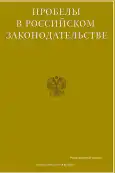Status and Possibilities of Using Materials Obtained Outside the Procedural Form in Proving Criminal Cases
- Authors: Berova J.M.1, Khamgokov M.M.1
-
Affiliations:
- North Caucasus Institute for Advanced Studies (branch) of the Krasnodar University of the Ministry of Internal Affairs of Russia
- Issue: Vol 15, No 5 (2022)
- Pages: 456-460
- Section: Articles
- URL: https://journals.eco-vector.com/2072-3164/article/view/531778
- ID: 531778
Cite item
Abstract
Proving in criminal cases consists in the collection, verification and evaluation of evidence. This fact is of fundamental importance for making a fair decision on the case. Proving is regulated in great detail by the current criminal procedure legislation, but in practice there are a number of situations when issues related to the use of materials obtained outside the procedural form become particularly relevant. On the one hand, it is in the interests of justice to use materials of interest to establish objective truth in a criminal case, on the other hand, such situations create threats of violation of the rights of participants in criminal proceedings. The purpose of the presented research is to analyze the current status and possibilities of using materials obtained outside the procedural form in proving criminal cases. The authors come to the conclusion that by now there are very contradictory positions of the legislator, law enforcement practice and the scientific community on the stated issues. On the one hand, the non-procedural form of proof is not fully denied, and in some cases, on the contrary, finds approval as a very effective way to obtain the necessary information about the circumstances of the commission of criminal acts, on the other hand, there is no detailed regulation of the status and possibilities of using such materials in the current legislation. Attention is focused on the need to eliminate gaps existing in the current legislation in order to formulate a unified approach to non-procedural proof and improve the effectiveness of investigative judicial practice, taking into account the rights and legitimate interests of all participants in criminal proceedings.
Full Text
About the authors
Juliet Mikhailovna Berova
North Caucasus Institute for Advanced Studies (branch) of the Krasnodar University of the Ministry of Internal Affairs of Russia
Email: lel4993@mail.ru
Dr.Sci.(Law), Police Colonel, Deputy Head Nalchik, Russia
Muradin Mukhamedovich Khamgokov
North Caucasus Institute for Advanced Studies (branch) of the Krasnodar University of the Ministry of Internal Affairs of RussiaPolice Colonel, Head of the Department Nalchik, Russia
References
- Appeal Ruling 1 of the Western District Military Court dated 11/23/2021 No. 22-139/2021 // The document was not published. SPS ConsultantPlus.
- Vytovtov A.E. The significance of the results of operational investigative activities as means of proof in criminal proceedings // Problems of economics and legal practice. 2020. No. 2. pp. 317-321.
- Kardanov R.R., Shkhagapsoev Z.L. Actual problems of proof in criminal proceedings of the Russian Federation // Problems of economics and legal practice. 2021. No. 2. pp. 302-306.
- Resolution of the Plenum of the Supreme Court of the Russian Federation of 31.10.1995 No. 8 "On some issues of application by courts of the Constitution of the Russian Federation in the administration of justice" (ed. of 03.03.2015) // Rossiyskaya Gazeta. 1995. No. 247.
- Rossinsky S. B., Vytovtov A. E. Proper understanding of the results of operational investigative activities is the key to solving the problem of their use in proving criminal cases // Lex russica. 2022. Vol. 75. No. 1. pp. 60-73.
- Tatarov L.A., Gelyakhova L.A. The use of non-traditional methods of obtaining information in proving criminal cases // Gaps in Russian legislation. 2019. No. 5. pp. 158-160.
- Criminal Procedure Code of the Russian Federation of 18.12.2001 No. 174-FZ (ed. of 14.07.2022, with amendments. dated 18.07.2022) // Collection of Legislation of the Russian Federation. 2001. No. 52 (part I). Article 4921.
- Khaliullin T.M., Kornelyuk O.V. Actual problems of using the results of operational investigative activities in criminal proceedings // International Journal of Humanities and Natural Sciences. 2022. No. 4-3. pp. 208-210.
Supplementary files








